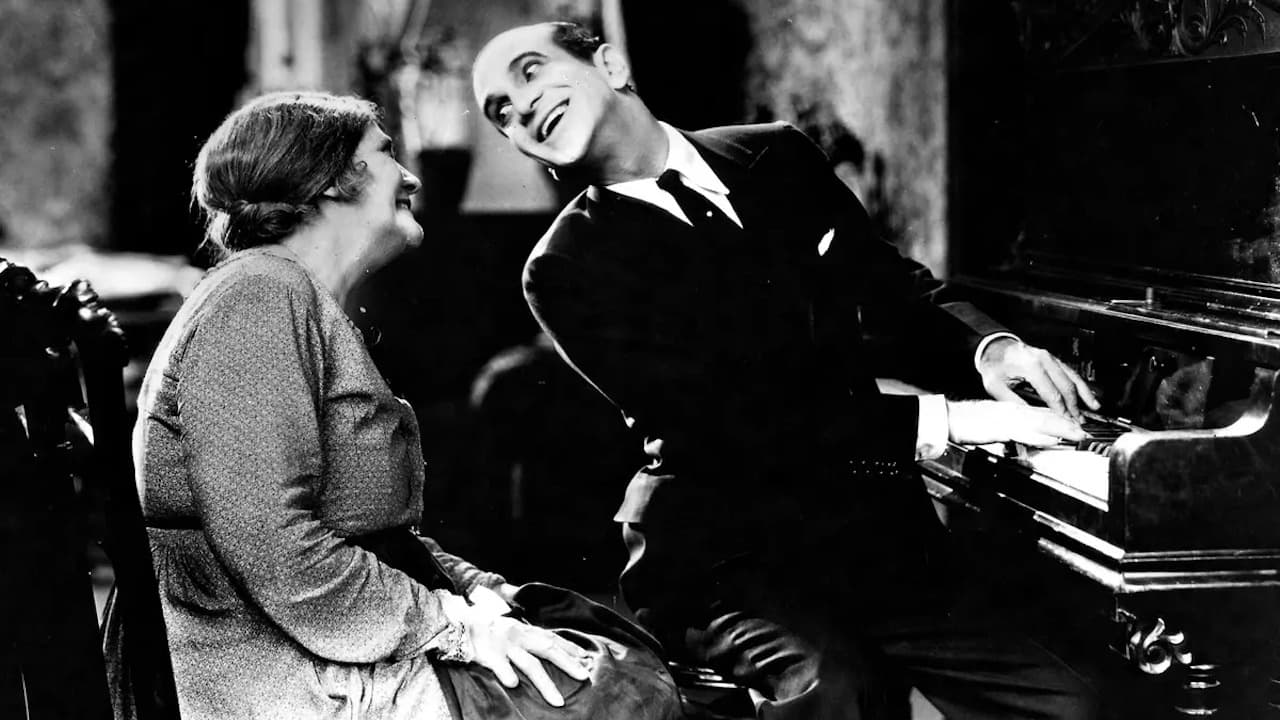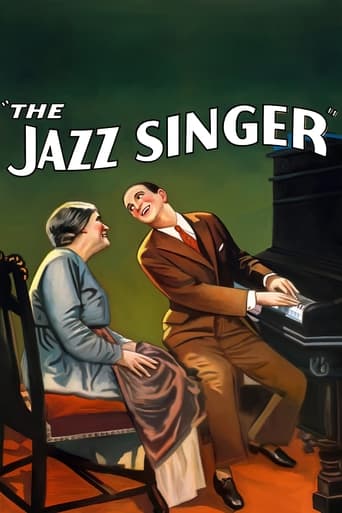

If you've never seen it what you have to get into your head is that THE JAZZ SINGER wasn't the first all-talking picture. In fact, it was a silent picture to which a certain amount of talking and, of course, singing was later added and in such a perfunctory way it's little wonder people said it would never catch on. This looks like an experiment and not a very good one. It was based on a play by Samson Raphaelson though it was hardly likely to be remembered as great drama; indeed it is shamelessly sentimental and melodramatic. Fundamentally this is a vehicle for the great Al Jolson who, even in these primitive circumstances, brings the stamp of his considerable personality to every scene in which he sings. As the man himself says, "You ain't heard nothing' yet". You can just imagine how cinema audiences must have felt at the time.
... View MoreIn a review here on IMDb of Jerry Lewis' 1959 TV version of the Jazz Singer a reviewer stated that the Jazz Singer is a film very much of its time. I've now seen four versions: Lewis' TV adaption, the original with Al Jolson, the 1952 Danny Thomas version, the Neil Diamond 1980s version, and Jerry Lewis' TV adaption. I now understand why the Jazz Singer belongs to its original time period. It's not a story about a jazz singer - though all the versions over the years have kept the title. At first I thought it was Jolson's personality and performance that made the story legendary. Certainly the power of hearing Jolson sing was instrumental in making the original movie a sensation.The story is about the old clashing with the new: it's apt that it was chosen for Jolson's vehicle, part silent mixed with the scenes of Jolson singing (as I remember it, none of the scenes with sound were all dialogue: all featured singing, and two of the singing voices weren't Jolson's).It's also about the old generation clashing with the new generation: the father's old world cantor struggling with the son's new world show business song and dance man.The story doesn't really work in the later versions. Jerry Lewis was a good singer and he's fantastic in the opening sequence. But his version is really more about him as a comic. The Thomas version is bland and pedestrian. The Neil Diamond version is cheesy and unconvincing: for one thing, he's not a jazz singer, he's a pop singer. The later movies are dominated by the echoes of the elements of the Jolson movie, already clichés by the end of the 1920s: the big show, the big chance, the call to his father's deathbed, and the last scene with the son honoring the father.The original is charged by its reflections of Jewish culture: the big chance comes on the evening of Yom Kippur, and the son's reconciliation comes through performing his father's role of singing Kol Nidre and leading the evening services. For me one of the most powerful sequences of the movie doesn't feature Jolson singing: it's the scene in which his character hears Yossele Rosenblatt singing- in a theater, note, not in a synagogue. I realized that the Jazz Singer also echoes the anxieties of the first European born generation regarding the American born second generation: will they keep the traditions, or reject everything, including morality and religious belief. The 1950s versions- both the Thomas movie and Lewis' TV play- have a father who is evidently American as well. Hence the story doesn't have the resonance of the fears of adjusting to a new country and the freedom it brings. (Diamond's version features a father who is a Holocaust survivor, but as I remember it the movie doesn't greatly explore the father's ambivalence towards the openness of American society.)The later movies are also dominated by the echoes of Jolson's performance, not just his singing, but also in the scenes in which he pays tribute to his father and his heritage by leading the Kol Nidre service. It's both interesting and bizarre that in the closing of the Lewis version, Jerry Lewis is wearing cantor's robes and his clown makeup in the synagogue before the congregation- a reference to Jolson as a show business legend and to Jolson's performance as Jack Robin, the son conquering the new world with its modern new media, and at the same time continuing the culture of his heritage. The movie still has much to say to modern audiences. And despite the limitations of the early sound technology the outdated conventions of silent film acting and storytelling, and the numbers in blackface which are now seen as offensive, Jolson shines in the performance of his life.
... View MoreThe son of a Jewish Cantor (Al Jolson) must defy the traditions of his religious father in order to pursue his dream of becoming a jazz singer.Today (2015) this film is known for two things: being the first feature-length film to have sound, and for having its star perform in blackface. For the former, it will always be historically important. For the latter, it will always be looked down upon by some, though it should be seen less as a racist film and more a simple product of the time.Either way, it is just not that great of movie. If you like hearing 1920s songs sung by a guy swinging his hips, you may enjoy it. And it has something to say about sons going their own way, even when they could easily follow their father. But the movie is really not that amazing.
... View MoreIn NYC, child Jakie defies his father Cantor Rabinowitz, his culture and family tradition to sing in the ragtime jazz club. He runs away after a whipping by his father. Years later in Chicago, Jakie (Al Jolson) becomes singer Jack Robin. He's smitten with performer Mary Dale (May McAvoy) and she gets him an important opportunity.This is the first feature-length motion picture with synchronized dialogue sequences. There has been shorts with dialogue but this is considered the dawn of the talkies. Al Jolson's first line is "Wait a minute, wait a minute, you ain't heard nothing' yet" which is great on many levels. The story itself is nothing special but at least, it doesn't suck. For such an iconic movie landmark, it would be horrible if this movie is bad in any way. It's a musical with a couple of great songs. The blackface could be irksome for parts of modern audience but that's the style back in the day. It's not meant to be offensive. This is worthy movie for such a big technical signpost.
... View More